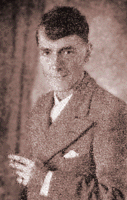This book about European languages written in 1942 by Frederick Bodmer is sadly hard to get nowadays. Bodmer had Chomsky's job in MIT before he retired. Which in the linguistics world is a bit like being the opening act for Jesus.
The book was written with the encouragement of and edited by his friend Lancelot Hogben. Hogben had a vaguely Victorian project, entitled optimistically "The Age of Plenty", to write good books in a few different areas so that people could educate themselves.
Mathematics for the Million (1936) and Science for the Citizen (1938) were the first two and "History for the Homeland" the fourth. Hogben seems to have been quite a Victorian kind of guy with a certain smoking jacket cool
Hogben was mocked by Orwell for his staid writing style. But if you judge a man by the quality of his detractors Orwell is a great one to have. To Hogben's eternal credit he fought against the cloven hoof of eugenics at a time when it was horribly popular.
The loom of langauge is like a secret handshake among language nerds. When you start talking to someone else who has read it a few hours later you escape the conversational black hole where you've been ignoring everyone else. I can't keep a copy as I keep giving mine to people. The loom of langauge 'has always been my favorite book about learning languages' is just one example of the gushing reviews the book gets on language blogs.
'It is the only book that actually teaches languages instead of simply teaching how to learn languages.' The first section is a history of human language and alphabets. Next is a morphology and syntax of several languages and then a classification of languages throughout the world. The second section is mainly about how to learn vocabulary lists by taking advantage of similarities among languages particularly regular sound shifts from one language to another.
It is an old fashioned book in the sense it deals with European languages and pretty much ignores the fascinating languages of the rest of the world. But what it does do is lay out through history and logic where German and Latin languages come from. How they work and how they morphed and combined into English.
Mathematics for the million was really influential in the past. For example there is a great post here about how the book inspired him in his career. However nowdays the book seems not to be popular in the same way as the loom of language is. Still the mathematics book in 'the age of plenty' series is a classic and it should be available to more people.
This book was published during the second world war with the express intention that language learning could bring people together. The general principle of the age of plenty series was that we could and would learn if we just had access to the knowledge. I still think that is true and with smartphones, Gutenberg, librivox and other cool projects this really could happen. Hogben and Bodmer went to an huge effort to write this book and found 700+ pages during wartime rationing to try get us to talk to each other.
Maybe now 70 years after this book was written we can achieve its aim far easier than the authors imagined. If the book was released into the public domain everyone with a smartphone or computer could read it. Which is an audience of billions and much more than the million the mathematics book was written for or the '1,800 million people on this globe' when Loom was written. With smartphones we can achieve Bodmer's books aim easier than he could have imagined.

